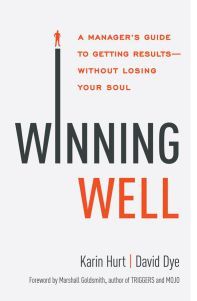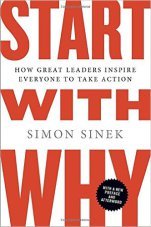Mike Henry Sr.'s Blog, page 108
June 9, 2016
Winning Well Leadership
 Karin Hurt and David Dye wrote an excellent leadership resource titled Winning Well: A Manager’s Guide to Getting Results — Without Losing Your Soul. I’m acquainted with both authors from a shared involvement in the Lead Change Group. Each is an accomplished author, speaker and leader. Together they created a helpful guide to leading a team as someone who creates win-win relationships.
Karin Hurt and David Dye wrote an excellent leadership resource titled Winning Well: A Manager’s Guide to Getting Results — Without Losing Your Soul. I’m acquainted with both authors from a shared involvement in the Lead Change Group. Each is an accomplished author, speaker and leader. Together they created a helpful guide to leading a team as someone who creates win-win relationships.
Today, I’ve posted a review over at the Lead Change Group blog. Please check it out. And get a copy of the book. It will be a great resource for you whenever you need a creative answer to the challenges of leading a team. The authors present a number of great ideas and approaches to help you not just survive in your management role, but to win with ease.
In fact, check out the review to find out about my favorite question. That section alone is worth the price of the book. Go ahead, check it out.
Filed under: Leadership Tagged: Book Review, character-based leadership








June 7, 2016
Give Win First

We all want to win. No one gets up in the morning and decides, “Today, I think I’d like to lose for a change.” You never tell your spouse, “Honey, I’m so used to losing that today, I’m managing expectations. My goal is to lose. That way, when I lose, I’m a winner!” We use terms like Win-Win because if we win, we’re more than happy for others to win too. It’s human nature. I’ll let you win if it helps me win. Isn’t that what Win-Win is all about?
Who do you trust?
Think for a moment about the people you trust the most. Got a picture of them in your mind? What is it about them that inspires you to trust them? Somewhere very near the top of the list is the thought that they are “for” you. They understand your best interests and demonstrate a willingness to work in your best interests. The people you trust the most are people you believe would work for your best interest even if it didn’t mean they would directly benefit. In fact, if you’re like most people, you trust people to the degree that you think they care for you or are for you without regard for their own outcomes.
By the same token, we tend to trust least where we believe people are “in it” for themselves more than we are in the relationship for ourselves. There’s almost a balance or an honor among thieves if we’re both in the relationship for what we can individually get out of it. Many relationships exist on that principle.
Give Win First
But true Win-Win begins when someone else gives win first. In order for you to demonstrate that you are worthy of trust, you must give win first. When you can make the other person a winner, they will trust you and want to reciprocate. We trust people most when we believe they are truly for us more than they are for themselves.
Remove Friction
Trust lubricates relationships and interactions. We are free to do and be our best around people we trust. Rather than bemoan the lack of trustworthy people today, work to make sure you’re trustworthy. Examine your key relationships with your leaders, peers, collaborators and teammates. How can you give win first? How can you provide overwhelming evidence that you’re trustworthy? Constantly grow your trustworthiness and improve the performance of everyone you influence. That’s the kind of trend our world needs today.
This post first appeared over at The Lead Change Group blog.
Photo © nikkytok www.123rf.com
Filed under: Leadership Tagged: Trust, win-win








June 2, 2016
The Most Worthy Cause

My last post was about spending our lives in a worthy cause. We each choose how we define worth. The thoughts below are my own. They are based on the things I’m learning to value. We discussed how “Why?” pointed at the past creates a victim mindset, but “Why?” pointed to the future gives us purpose. Our worthy cause is our purpose.
There is no more worthy cause than restoring mankind to a relationship with our Creator. I didn’t make that up. It was God’s idea. His ideas are always the most worthy cause in my judgment too. My judgment is based on how my life was changed when I decided to adopt a biblical view of living. I asked myself then and still do today. “What if what Jesus says is true? What if a holy, almighty God created me, in particular, on purpose?” Did I really break our relationship even before I understood the consequences?” I believe I did.
Therefore, I’m glad God chose to restore my relationship to him. I couldn’t do it. I’m dependent on him for the effort.
God’s ideas are always the most worthy cause.
But once the relationship is restored, my next question is, “What for?” Or stated as I did last week, “Why?” What was God’s purpose in restoring me? If it was simply to recreate the relationship, why didn’t He just take me to heaven? Why did he leave me here, at the same old job, with the same problems, finances, history and situation?
The only answer I can come up with is so I can take part in His work. I’m able to join him in his work. Because I’m willing to believe and then act, God gives me a role and empowers me in his cause. I follow Jesus, to whatever degree possible using the Bible and the Holy Spirit as my guide and God determines the impact.
If God saved me solely for a relationship with Him, why am I still here?
Unfortunately, I get distracted by my own selfishness, habits and history. Often I find myself either totally pursuing selfish objectives or whining about the fact that things aren’t going my way. Philippians 2:14 tells us to do all things without grumbling and disputing. God knows my tendencies and provide an answer. Just don’t do it.
When I’m conscious of God’s “Why?” I remember the purpose and the future. God has a purpose for me. When I consider his future-focused “Why?” I get the strength to turn from grumbling and disputing to enthusiasm and hope. I remember God is in control. He knows what will happen today and how. He understands why I’m here and what everyone is doing. He has a work for me to do in the things that are happening today and he doesn’t want me to grumble or dispute. I need to dare greatly and spend myself in His worthy cause.
I’m getting ready to launch a community of believers who help each another live our faith full-time. If you’d like to know more about being a part of that group, contact me here.
Photo © Gajus at Fotolia.com
Filed under: Leadership








May 30, 2016
Spent in a Worthy Cause

My career has largely been characterized by a negative attitude. I find it easy to second-guess my own leaders, especially when I’m not involved in the decision-making process. When I worked for my dad, even though he had over 20 years more experience than me, yet I was critical of his decisions. My critical spirit made it difficult for me to remain with the company and I eventually left, twice.
Recently, I was preparing for a talk titled The Why of Job Loss and I came to a contrast in how the question “Why?” affects us.
Why can cause us to wallow in the past or it can launch us into the future. When our reasons face backward, toward the past, they pull us back, into the pain and regret of the past or into a longing and a desire for the past. We ask “Why?” so we can fix blame. We chose to be a victim when our “Why?” questions face the past.
“Why?” can cause us to wallow in the past or it can launch us into the future.
 However, a forward-looking “Why?” launches us into our future. Simon Sinek wrote a challenging and encouraging book titled Start With Why where he asserted our best energy comes from our most excellent “Why?” Connecting our activity with our purpose mobilizes and energizes us. We gain the strength to overcome obstacles and achieve the impossible when we are grounded to a powerful, elevating, reason for action. Our answer can pull us past the point where others failed and beyond those who said it couldn’t be done. Power, energy and strength come from the answer to our “Why?”
However, a forward-looking “Why?” launches us into our future. Simon Sinek wrote a challenging and encouraging book titled Start With Why where he asserted our best energy comes from our most excellent “Why?” Connecting our activity with our purpose mobilizes and energizes us. We gain the strength to overcome obstacles and achieve the impossible when we are grounded to a powerful, elevating, reason for action. Our answer can pull us past the point where others failed and beyond those who said it couldn’t be done. Power, energy and strength come from the answer to our “Why?”
Power, energy and strength come from the answer to our “Why?”
On the other hand, negativity creeps into my day when I jump to conclusions about the motives for others’ decisions. When I’m not in a position to influence the decisions, do I give my peers the benefit of the doubt or do I jump to criticize? Too often, I criticize.
My favorite quote of all time is the Man in the Arena quote by Theodore Roosevelt. He gave the speech in 1910. I first became acquainted with the quote in the book, If You Want To Walk On Water, You’ve Got To Get Out Of The Boat by John Ortberg. I’ve since read other books that reference the quote too, including Daring Greatly, by Brené Brown.
It is not the critic who counts, not the man who points how the strong man stumbled or where the doer of deeds could have done them better. The credit belongs to the man who is actually in the arena; whose face is marred by dust and sweat and blood; who strives valiantly…who knows the great enthusiasms, the great devotions, and spends himself in a worthy cause; who, at best, knows the triumph of high achievement; and who, at the worst, if he fails, at least fails while daring greatly, so that his place shall never be with those cold and timid souls who know neither victory nor defeat. Theodore Roosevelt, Citizen In A Republic, April 23, 1910
President Roosevelt understood “Why?” to be a question for the actor, rather than the bystander. The actor owns the “Why?” and may alone question the decisions made or the actions taken. Used facing a worthy cause, “Why?” inspires valiant effort, high achievement and daring failure. Acting on the “Why?” guarantees separation from “the cold and timid,” with the warm and courageous.
Will you be cold and timid? Or will you spend your life in a worthy cause? God willing, I hope I choose the worthy cause every time.
Memorial Day in the US is our time to remember those who gave their lives so we could remain free. I’m grateful for the sacrifice. May I live a life worthy of their sacrifice. I wrote a post about Memorial Day in 2010 titled Earn This. Please take another couple of minutes and check it out.
Photo © Asp.inc Fotolia.com
Filed under: Leadership Tagged: action, choices, Memorial Day, responsibility








May 27, 2016
Earn This
I watched Saving Private Ryan yesterday. It was the first time I had seen the movie all the way through. I enjoy great movies, but few sad ones. I knew enough about this movie to know it was sad. I also knew the plot and story. It is truly an inspired classic.
James Francis Ryan lives his whole life thinking about the actions taken by a group of 8 soldiers who risked their lives to save him. The command to do so came from General George Marshall, Chief of Staff of the Army. Private Ryan would be returned home because his three brothers died within days of each other and he was the only one remaining. The squad of 8 led by Captain John H. Miller and Sergeant Mike Horvath must scour the French countryside searching for one soldier to return him to his family. Captain Miller’s last words, “Earn this!” were the challenge to Ryan that caused him to wonder if his life measured up.
 Several thoughts run laps around my brain in light of the US commemoration of Memorial Day, the holiday to memorialize those who died in military service to our country. Maybe they’re the same ones you considered after the first time you watched the movie.
Several thoughts run laps around my brain in light of the US commemoration of Memorial Day, the holiday to memorialize those who died in military service to our country. Maybe they’re the same ones you considered after the first time you watched the movie.
Simple Math
First, the simplicity of their math pulled them through the worst parts of their job. Not having served in the military, I expect day-to-day, down-to-earth life-and-death forces you to simplify your judgment. I was struck by the numeric evaluations each person made. First there was the 8 for 1 comparison the squad made in the fubar scene. Then there was this exchange where Captain Miller explained how he wrestled with command responsibility:
Captain Miller: You see, when… when you end up killing one of your men, you see, you tell yourself it happened so you could save the lives of two or three or ten others. Maybe a hundred others. Do you know how many men I’ve lost under my command?
Sergeant Horvath: How many?
Captain Miller: Ninety-four. But that means I’ve saved the lives of ten times that many, doesn’t it? Maybe even 20, right? Twenty times as many? And that’s how simple it is. That’s how you… that’s how you rationalize making the choice between the mission and the man.
The math is almost surreal in its simplicity. Quite a number of Americans and people of other nationalities have been born free because of their actions. In the end, the men didn’t just save Private Ryan, they saved the bridge. Their sacrifice made a difference. Yes, I know this was a fictional account, but the last 72 years have proven their sacrifice effective. The numbers are staggering. Consider the impact of your life on the lives of others over the next 72 years? How are you doing?
Cost of Inaction
The second thought I had was what it must have been like to live each subsequent day as Corporal Upham. First he was instrumental in freeing a German soldier the squad took captive. Since one of their own died in that exchange, the squad wanted to kill the German, but Captain Miller let him go free at Upham’s urging. Later, Upham failed to take action that may have saved some of the lives of his fellow men, initially not providing ammo and secondly by not shooting back at the Germans who eventually killed Captain Miller and Sergeant Horvath. He chose inaction, in direct contrast to Ryan who refused to leave his squad with the Germans bearing down on them, even though he had an excuse to leave.
When we choose to act, we free ourselves from a thread of judgment and second-guessing that only come into play from inaction. When you act, you question the action, but you never have to question the failure to act. In choosing to do nothing, Corporal Upham had only negative consequences to consider for a long time. Imagine the consequences of the inaction in your life. Remember that feeling the next time you consider doing nothing when you could act.
Did we earn it?
Finally, I wonder as an individual and as a nation whether or not we have earned the sacrifice of the men and women we memorialize on Monday. What have we done with the gift purchased by the men and women who have died in the military of not just America but other free nations. Have we made good choices? Would they be proud of us, our tendency to let power corrupt us or our proclivity for laziness. We have tremendous resources beginning with our lives and the freedom purchased for us by their sacrifice. How are we doing?
Thankful
I am grateful for the sacrifice made by every person who has been wounded or died in the service of the United States. However I must also admit that I could improve my stewardship of the freedom they sacrificed to purchase. But for my part, when I remember the Captain’s final words, I’ll want to question them applied to my life. When my time comes, I hope to be able to say that my life justified the sacrifice made for me by the those who gave their lives in service to the United States of America.
This was originally published on the Lead Change Group blog, May 30, 2010.
Filed under: Leadership Tagged: action, Memorial Day








April 27, 2016
Receive to Ship
In My Utmost for His Highest on April 27, Oswald Chambers says, “God wants you in a closer relationship to Himself than receiving His gifts, He wants you to get to know Him.” I’m reminded of the passage in Philippians 3:7-14 where Paul asks, “that I may know Him, and the power of His resurrection and the fellowship of His suffering, being conformed to His death.”
Have you ever been misunderstood? I often make statements others hear differently than I intended. Once, I told a friend I hoped to pursue a greater challenge with my life. My friend heard me wanting to pursue a grandiose outcome for my glory. I didn’t think I had considered a glorious outcome, but a noble pursuit. Did my friend hear my intentions better than I understood them myself? Was his warning God cautioning me to avoid pursuit of glory for myself? Possibly.
 God gives us things so we can give them away. Our call is to live as a sacrifice (Romans 12:1). We are not our own. Because of my experience in the warehousing industry, I think of myself as a grace distributor. Jesus ships things to my warehouse and I store them for Him but only for a short while. He will soon instruct me where to ship those goods. The inventory can be goods, energy, encouragement, or the fruit of the spirit, love, joy peace, patience, kindness, goodness, faithfulness, gentleness, or self-control. Whatever they are, they’re not mine, they’re His. The goal isn’t to store more of His stuff. My goal is to ship the grace entrusted to me wherever the Owner instructs. I want to turn the inventory as much and as often as Jesus requests.
God gives us things so we can give them away. Our call is to live as a sacrifice (Romans 12:1). We are not our own. Because of my experience in the warehousing industry, I think of myself as a grace distributor. Jesus ships things to my warehouse and I store them for Him but only for a short while. He will soon instruct me where to ship those goods. The inventory can be goods, energy, encouragement, or the fruit of the spirit, love, joy peace, patience, kindness, goodness, faithfulness, gentleness, or self-control. Whatever they are, they’re not mine, they’re His. The goal isn’t to store more of His stuff. My goal is to ship the grace entrusted to me wherever the Owner instructs. I want to turn the inventory as much and as often as Jesus requests.
The receiving and shipping of “things” is how we get to know God. Chambers goes on to ask, “Are you prepared to ask yourself what it is you want from God, and why you want it?” Am I able to ask God to show me why I want the things I’m asking Him for?
Lord, may I want the outcomes You want. Please may I remember you’ve called me to ship? Challenge me to ship everything you give me and use it to bless others and make you known. Help me know you, your power and your fellowship. And make me a living sacrifice. Thank You.
Photo copyright: ifong / 123RF Stock Photooes G
Filed under: Faith Tagged: give, ship








March 29, 2016
Change With Patience
I’ve recently been writing about patience. I agreed to do one post and that prompted Lead With Patience, and now this. I found that patience relates in some degree to contentment and expectations. If we can manage our expectations, we can demonstrate patience. Patience is trusting, in the moment, the benefit will outweigh the delay. When the delay exceeds our expectations, we’re tempted to park our patience and “just do something about it.”
There are times when we still need patience even though we anticipated the hardship. For example, how do we behave when our team or our leaders make a different choice than we would, and their choices force a delay in a desired outcome? As a middle manager, I experience this most often at work. I don’t get the budget for the people or the systems I want. The IT department can only do so many things at one time, and my project has to wait. I’m sure you can think of some examples too.
How do you act when these types of things take place? Do you pout and complain? Do you whine and grumble to your coworkers or your peers or the people who agree with you? Have you ever noticed how talking with people who agree with you never changes anything?

Patience disagrees with people who can make the change. Patience pursues the change regardless. Sometimes that pursuit is simply waiting. Other times Patience must find a way to speak respectfully with those with whom we disagree. Patience will organize facts and consider all of the knowledge and values involved in a disagreement. And Patience does their job, understanding sometimes we need to learn things for ourselves before we can reach agreement.
Do we have the patience to speak with and learn from people who choose not to agree with us? Patience gives us the grace to give our best effort and honestly work for the correct outcome.
Has anyone ever patiently, courageously asked you to make a change? Did you do it? Do others find it easy to disagree with you? Do you find the patience to make a decision successful even if you didn’t agree with it? Share your thoughts and help us out. Thanks.
Photo credit unsplash via Pixabay.com
Filed under: Leadership Tagged: Change, character-based leadership, patience








March 21, 2016
Lead With Patience
I wrote a post over at Owasso Character Council titled Patience Is Contagious. Each month we promote a trait in the city as part of our City of Character initiative.
Patience actively trusts, in the moment, the outcome will be worth the delay. As we trust the value of our outcome to exceed the cost of the delay or the effort, we practice grace, peace, confidence and we inspire others to practice them too.
For me, the problem is the phrase “in the moment.” If you’re like me, you started your effort or you decided to pursue a goal because it was worthwhile. It’s valuable to go to work. It’s important to help your kids with homework. We look forward to riding a roller coaster or getting a haircut. Otherwise we wouldn’t have started to do them in the first place. After we start, when our focus is locked on the outcome, we experience the delays, the lines, the obstacles. We forgot them when we were focusing on our goal. They almost always catch us by surprise and they often exceed our expectations.
The secret to happiness is to maintain low expectations. – Mike Henry Sr.
I often say the secret to happiness in golf is to maintain low expectations. In some degree, my inability to be content with the time something takes contributes to my impatience. I get locked on the goal, and expose my impatience when I’m surprised by the time something took or the extra cost. I quit a lot of jobs when I was younger because I could find something else rather than wait (and work) for a better outcome. My impatience caused a lot of transition in our lives.

But I’m learning to trust, at least sometimes. Can you trust the benefit will be worth the delay? Do you jump off the highway and try to find another route, or do you wait it out? Do you bail on a project or a job or a career when the going gets tough? I find my patience grows when I remember and focus on the benefit I expected. I also find my patience grows when I chase noble goals. Little goals and small rewards simply aren’t worth the effort for me any more. Small dreams aren’t worth chasing. I want to chase big dreams and exercise the patience and the persistence to achieve great objectives.
What about you? What’s your big dream? Do you have the patience for it? Maybe you’ve already reached it? Would you share about how you stuck it out? Was it worth it? How can you help us manage our expectations so we apply patience to achieve our greatest dreams?
Photo credit carlovenson Pixabay cc0
Filed under: Leadership Tagged: character-based leadership, expectations, patience








March 16, 2016
Do You Stultify Your Team?
On February 10, 2016, I was re-reading My Utmost for His Highest by Oswald Chambers and I came across an old word whose meaning was unfamiliar to me: stultify. Have you ever looked it up?
stultify: 1:to allege or prove to be of unsound mind and hence not responsible; 2:to cause to appear to be stupid, foolish, or absurdly illogical; 3a: to impair, invalidate, or make ineffective: NEGATE; 3b: to have a dulling or inhibiting effect on.*
I appreciate My Utmost because the author challenges me into an old-fashioned relationship with Christ. Over the years, I’ve found several words I didn’t know and had to look up. The book was first published in 1935 and, when reading the original version, you can tell it from the word usage alone.
The entry in My Utmost is about how our imaginations become stultified by things of the Earth. The word is actually used in a sentence about our prayers being stultified (or seeming futile) because we have no imagination and no power of “putting ourselves deliberately before God.” We don’t believe God is as big as He is and we therefore stultify our own imagination. We satisfy it with less than it could be until we really don’t believe something as great as God exists. The author even speaks about how nature is the way it is to draw our attention to The Great God, the One and Only who created all things.
In our workplaces, how often do we stultify our team members? How often do we not give them all the facts and cause them to make less than the best decision? Then we come back and criticize their outcome, encouraging them to avoid responsibility in the future. Ring a bell? How often do we let our reports act on something without enough guidance? How often do we put them in a position to fail?
Every time we limit our team’s ability to succeed, we risk stultifying them. Certainly some limits are necessary. We can’t simply purchase everything or hire everyone needed to achieve every objective in the requested time frame. Much of life is a balance between competing desires. However as leaders, we either help our people win, or watch them (emotionally or physically) quit. No one wants to under-perform, fail, or come up short. Once our teammates believe they will never reach their goals, they’re tempted to settle for mediocrity, much like Seth Godin wrote about in The Icarus Deception. People who reject mediocrity leave. We find we’ve created a culture that rewards mediocrity.
Can you think of other ways we stultify our teams? List a few below in the comments. Then, find ways today to remove any artificial and stultifying limits placed on our team members. Help them flourish in their jobs and their lives. In the end, your team and your work will begin to energize you. Their excitement will make work fun again.
Note: Modern reprints of My Utmost don’t use “stultify” but substitute “sense of futility.”
Photo (c) despair.com
Filed under: Leadership Tagged: flourish, futility, Icarus, mediocrity








March 13, 2016
On Mission – Survey Results Part 3
We’ve been sharing some thoughts and discoveries from the Christian Faith in the Workplace survey we ran on this site in the first half of 2015. You can find the other posts on this site tagged Survey.
We had 591 completed responses including 534 (90%) who consider themselves Christian. We then asked the Christians about their employment, and 44 people said they were employed full-time by a church or a para-church ministry. We asked this group of people different questions than the others.
The primary question we asked was, “What percentage of people do you think are actively on-mission with Christ in the workplace?” Forty-three people answered. The answers ranged from 0 to 100%. We didn’t define the term “on-mission” but rather we simply asked the question.
The responses were:
5% or less 7 people (16.2%)
10% – 14 people (32.6%)
15% – 2 people (4.6%)
20% – 5 (11.6%)
21% or greater (30.2%)
I wish we had asked more follow up questions. For example, what do we consider the “job” of a Christian in the workplace? Is our “job” simply to invite people to church? What does a workplace-oriented Christ-follower do when they’re at work? Is there a “ministry” or a “mission” we are called to in the workplace? Is Jesus busy at our workplaces? What do we think Christ is doing? Do we think God provides opportunities for us to join Him in His work? Should we be about anything other than work in our work?
In Experiencing God by Henry Blackaby and Claude King, the authors demonstrate from scripture that God is busy, active and at work everywhere right now. All we have to do is look for his work and join him in it.

In one way, we are all on mission with God. God is not disappointed or discouraged or surprised by our lack of choosing to participate with him. Our lack of participation isn’t outside of his power or his will. If God wants us to participate, he can arrange things so we participate. He is sovereign so coming from one perspective, we all participate with him. Only one person answered 100%. I wonder if that person shared my idea.
But in another way, we each have a choice. When we choose to look for God, even if He tells us to sit and watch, then we do His work in our world, and take part in the eternal. Our lives and our time become treasures laid up in heaven (Matthew 6:19-21). The eternal parts of my life are those where I have helped others and served others, prayed, spoken, or lived so that God would be known and that people would move one notch closer to Him.
Sometimes, I think our world believes the “real” Christians are the ones on stage or in some third-world country. They think the rest of us just watch (at worst) or help and support (at best) the “real” Christians. However, I’ve met a large number of “real” Christ-followers in the workplace. They’re accountants and sales people, managers, engineers, even lawyers. When we choose to ask God to use our time for His glory, we are on-mission with Him. He wants us closer to Him regardless of our situation.
I see my job as 1) doing my job better than expected according to my company’s needs, and 2) helping anyone move one notch closer to Jesus. What about you? Have you thought about your mission? What job has God called you to and are you doing it? Have you ever wondered how God would have you do your job? What ways do you try to keep your relationship with Jesus fresh at your place of work? And how can I help. Take a minute and share your thoughts in the comments. Thanks in advance!
Filed under: Faith Tagged: survey, workplace












